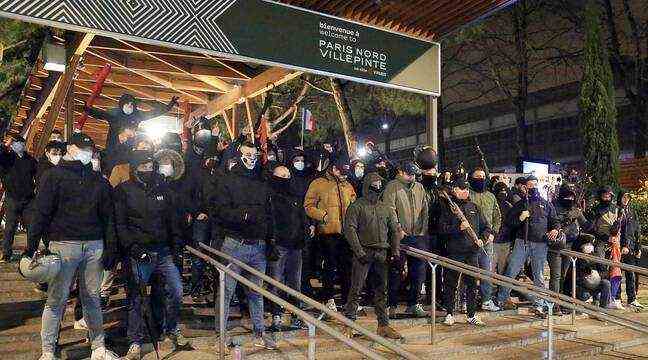Accused of violent operations or of inciting hatred and violence, three ultra-right groups with different modes of action were dissolved in less than a year by the government: the Zouaves Paris, Génération identitaire and the Alvarium.
The “hooligans” of the Zouaves Paris
The Zouaves Paris (ZVP) returned to the spotlight at the start of December. They are suspected of having participated in the violence which targeted anti-racist activists during a meeting of far-right presidential candidate Eric Zemmour in December in Villepinte (Seine-Saint-Denis). In the process, the government announced on January 5 the dissolution of this informal group which appeared in 2017 and which brings together around twenty members. He is accused of being “at the origin of numerous (…) violent acts”, of “spreading an openly racist discourse” and of “regularly broadcasting images containing the symbols of Nazi ideology”.
The one who is suspected of being the leader of the group, Marc de Cacqueray-Valmenier, was indicted – with another person – for intentional violence after the incidents in Villepinte. The 23-year-old activist was also imprisoned on January 20 for not having respected his judicial control by participating five days earlier in a Parisian demonstration against the vaccination pass during which two AFP journalists were attacked. It was therefore from the box of the defendants that he learned on Friday of his sentence to one year in prison for the attack on a Parisian bar of the anti-fascist movement in June 2020.
This operation had been claimed by the Zouaves Paris, who gather for “a moment, an action” violent in the manner of hooligans, explains researcher Nicolas Lebourg. If they were not formed into an association, they represented a “de facto grouping” of identity and neo-fascist militants “already engaged before within the GUD or the Bastion social [tous deux dissous] adds researcher Marion Jacquet-Vaillant. They boast of their violent actions, especially against the “antifas”, on the Telegram loop “Ouest Casual”.
Identity generation and the “happening”
Unlike the Zouaves Paris, Génération identitaire (GI) was an association under the 1901 law until its dissolution on March 3, 2021. Created in 2012, GI is accused of “incitement to discrimination, hatred and violence” and of having the “willingness to act as a private militia”, in particular since an operation against migrants in the Pyrenees conducted in February 2021. These activists, identified by their blue down jacket, had already hit the headlines in the spring of 2018 by leading anti-migrant patrols in the Alps or by occupying buildings, including the Poitiers mosque (Vienne) in 2012.
Their “happening” and “agit-prop” operations were relayed by licked videos and broadcast to a wide audience, in order to “draw the attention of the media to problems in our society and then have political repercussions” , according to their latest spokesperson, Thaïs d’Escufon. Unlike the Zouaves Paris, Génération identitaire, whose number of activists and sympathizers was estimated at 800 at most, does not promote physical violence as a mode of action.
Initially constituted as the youth branch of the Identitaires, GI defends with this ultra-right movement an ethnic and cultural vision of white and Christian Europe, in which Islam has, according to it, no place. The small group thus advocates “remigration”, the return of all immigrants to their country of origin. Damien Rieu, their former spokesperson and former National Rally activist, joined Eric Zemmour.
The Alvarium and its local Angevin
Also constituted as an association, the Alvarium was dissolved on 17 November. The Angevin small group is involved, according to the authorities, “in acts of violence” and propagates “a discourse and ideas equating immigration and Islam with threats that the French must fight”. In previous months, several of its regulars had been sentenced by the Angers criminal court for meeting violence and flag theft.
According to political scientist Jean-Yves Camus, the association, which calls itself “at the confluence of nationalist doctrines and social Catholicism”, was “especially known for the regular skirmishes around its premises” which oppose “the core of Angevin identity militants to local anti-fascists. Created in January 2018, the association, which presents itself as “a community center for social and cultural actions in Anjou”, had also illegally occupied a vacant building in 2020. On its facade, its activists had displayed banners “La France to the French” and “Housing: let’s apply the national preference”.

